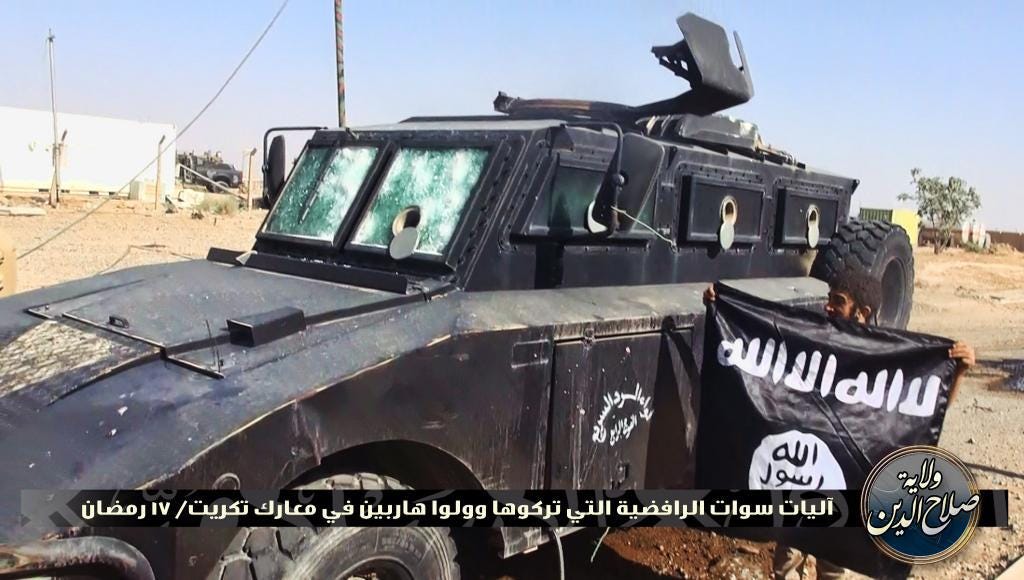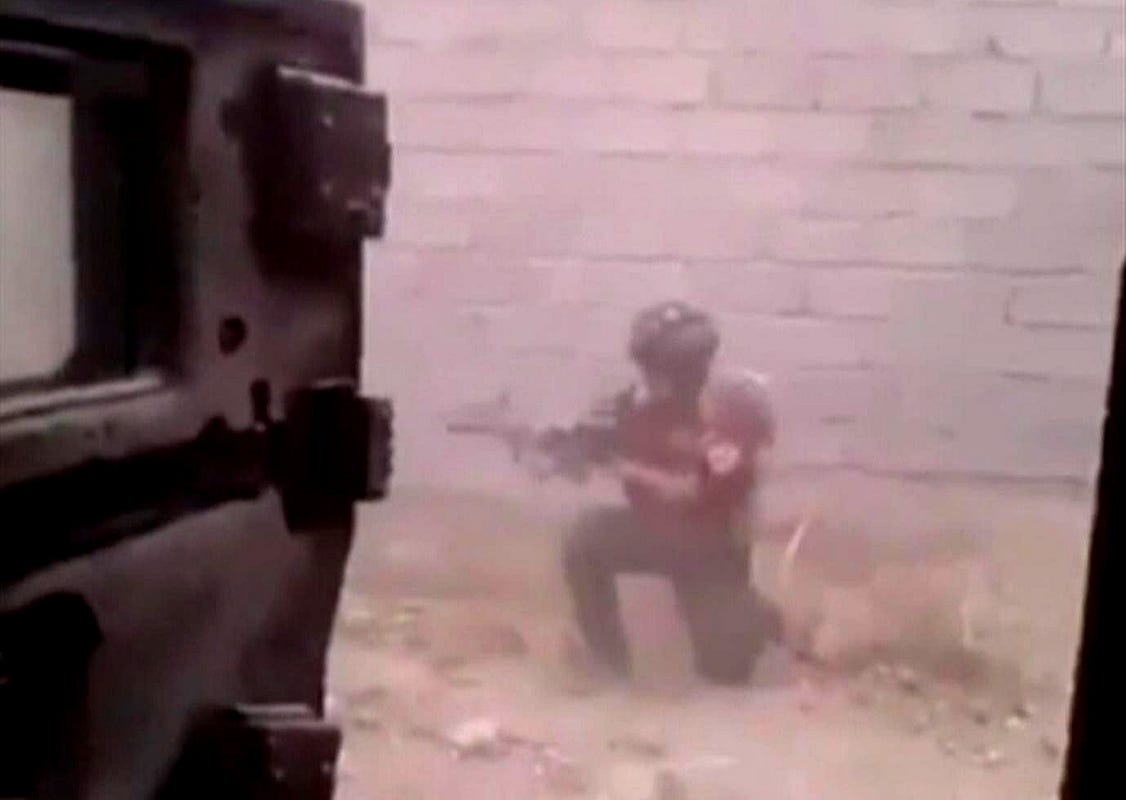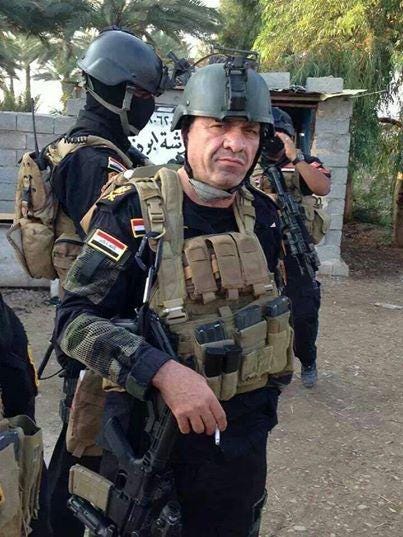Jassem Al Salami
Aug 13, 2014
Two months after Islamic State militants swept through northwestern Iraq all the way to the gates of Baghdad, there are signs that the ramshackle Iraqi army finally is finding its resolve. In Tikrit, the birthplace of late dictator Saddam Hussein and now an Islamic State stronghold, Iraqi special forces are on the attack.
Some of Iraq’s special troops are depicted in the photo above, taken by the AP’s Hadi Mizban in 2013.
On Aug. 6 in Tikrit, one of Iraq’s special Golden Brigades recaptured Hussein’s tomb, a highly symbolic monument for radical Sunnis including Islamic State. No less significantly, the Iraqi commandos also liberated the city’s water desalination complex. Water plays a central role in Iraq’s fighting.
For months, Iraqi soldiers mostly have retreated from militants’ attacks. Reforming around the commando units, Baghdad’s army now is pushing back. The situation is the same farther north. After steadily losing groundto Islamic State, the Kurdish Peshmerga militia is counter-attacking as U.S. Navy jet fighters and Air Force drones fly top cover.
The Iraqi army’s resurgence has occurred in fits and starts. Iraqi army and special counter-terrorism units first launched an offensive against Islamic State in the western city of Fallujah back in March. At the same time, Iraqi special operations troops embedded within regular army units as advisers and supervisors.
 But that was a piecemeal effort—and insufficient to halt the militants’ momentum. Hundreds of Golden Brigades commandos were in Mosul helping to supervise regular army units when Islamic State attacked the city on June 10 and routed the army.
But that was a piecemeal effort—and insufficient to halt the militants’ momentum. Hundreds of Golden Brigades commandos were in Mosul helping to supervise regular army units when Islamic State attacked the city on June 10 and routed the army.
A destroyed Golden Brigades armored vehicle. Islamic State photo
Iraq has three major special forces units—two Golden Brigades and the Wolf Brigade. Together they number probably fewer than 10,000 front-line troops.
The two Golden Brigades, which trained in the U.S. and Jordan, formally are part of the army. They wear distinctive black uniforms and ride in black-painted vehicles. The public refers to them as “SWAT,” a reference to America’s police Special Weapons Assault Teams.
The Wolf Brigade, by contrast, is part of the Interior Ministry. It pointedly did not train in the U.S. or Jordan. Instead, it recruited its fighters from Iraq’s Shia majority and includes not a few former members of the insurgent Badr Brigades. The Wolf Brigade largely falls under Iranian influence and has a reputation for human-rights abuses.
The Wolf Brigade also seems to have ties to pro-regime militias in Syria—hardly surprising, considering Tehran and Baghdad’s support for the Syrian regime. There have been sightings of Iraqi commandos inside Syria. Some Wold Brigade soldiers even have died fighting Sunni rebels in that country. Islamic State began as a Syrian rebel group.
Most famously, notorious Wolf Brigade sniper Abd Al Amir Karrar died during internal fighting among pro-regime militias.
The Golden Brigades also have gotten tangled up in Iraq’s complicated politics. In 2009, unauthorized police checkpoints caused huge traffic problems in Baghdad. Prime Minister Nouri Al Maliki vowed to shut down the checkpoints. Not long after, soldiers riding in black vehicles arrested the rogue policemen.
During the build-up to the current insurgency starting in December, Iraqi special troops mainly were advisers to regular army units—although in late May, Wolf Brigade commandos also conducted snatch-and-grab operations to capture Islamic State leaders in Iraq’s western province of Anbar.
The first op ended in disaster.
Helicopters deposited 20 Wolf Brigade operatives onto the target building’s roof and on the surrounding street. Two commando guarded the outside of the building while the other 18 stormed inside.
It was a trap. The jihadists had rigged the house with explosives. Eighteen elite commandos died in the blast.
The next Wolf Brigade raid was somewhat more successful. The brigade received intelligence on the whereabouts of Adnan Ismael, a senior Islamic State commander. The commandos attacked from helicopters but were unable to penetrate the militants’ defenses.
An Iraqi Golden Brigade commando in combat in June. Video capture via the AP
Incensed, Islamic State code-named its June 10 attack on Mosul after Ismael. The Wolf Brigade commandos advising regular army units in the city fled along with the other soldiers, many of them retreating north through Kurdish lines.
Wolf Brigade elements led by the notorious Abu Walid counter-attacked in Tal Afar but the militants repulsed them. The commandos and their embarrassed leader also fled into Kurdistan.
The Iraqi army quickly disintegrated. A desperate Baghdad recruited untrained Shia men to form a volunteer militia and assigned the Golden Brigades to lead these irregulars. They attacked toward Tikrit. Rather than directly resist them, the militants allowed the commandos and their militia allies to enter the city.
The militiamen failed to clear surrounding buildings. Suicide bombers raced from the structures and detonated themselves among the attackers, inflicting heavy losses.
Golden Brigades Maj. Gen. Fadhel Al Barwari. Photo via Iraqi social media
In the aftermath of the ambush, the commander of the Golden Brigades Maj. Gen. Fadhel Al Barwari personally took charge of his troops. He grabbed a machine gun and personally led the charge through Tikrit. The surviving militiamen rallied. M-1A1 tanks from the elite 9th Armored Division rolled in to help.
On Aug. 6, the Golden Brigades succeeded in taking back parts of the city. Iraq’s army still badly needs better training and leadership. But after months during which Islamic State seemed invincible, the commandos’ small victory in Tikrit at least inspires hope that Iraq—eventually and at great cost—can defeat the militants.
g 11


No comments:
Post a Comment